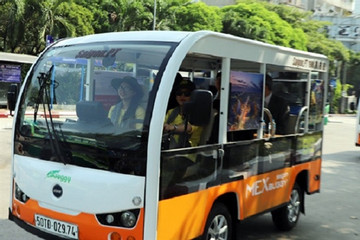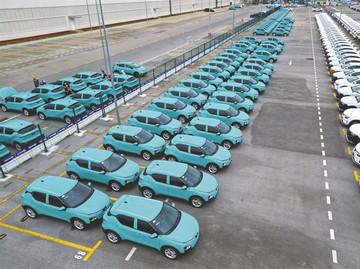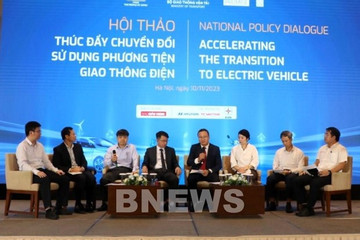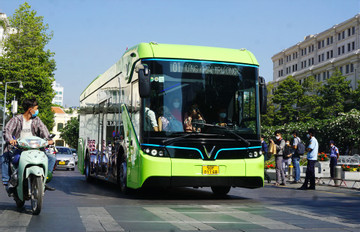- © Copyright of Vietnamnet Global.
- Tel: 024 3772 7988 Fax: (024) 37722734
- Email: evnn@vietnamnet.vn
electric vehicles
Update news electric vehicles
EVs' 'green' effect will save $498 billion in oil imports in VN
Besides playing an important role in reducing greenhouse gas emissions, the shift to green means of transport will help Vietnam save up to $498 billion in oil imports.
Most motorbike owners want to buy cars, but EV market remains small
While electric vehicles (EVs) are developing at lightning speed in the world market, they remain unfamiliar to most Vietnamese.
Chinese automakers enter Vietnamese market with new strategy
Instead of introducing low-cost cars to compete with Japanese and South Korean rivals as they did in the past, Chinese automobile brands have changed their strategy.
Hybrid models launched into market, Vietnam greening its transport
With the presence of over 10 hybrids, priced from VND500 million to VND1.3 billion, the Vietnamese automobile market has become more bustling.
Why did Chinese automaker BYD do a U-turn in Vietnam?
BYD's latest move shows that it just wants to sell products in the Vietnamese market rather than set up a factory and make a long term investment here.
10.5 million electric cars, 98 million electric motorbikes on roads by 2050
There are about 2.4 million cars in circulation and most of them run on gasoline, but by 2050 most vehicles will be electric, a report says.
Chinese electric cars face uphill battle in Vietnam's market
The Vietnamese market is witnessing a surge of Chinese electric cars since 2023, with five brands entering in just the past 12 months, covering all segments from mini cars to SUVs and MPVs.
Electric taxi firms can make money from carbon credit sales
A panel discussion on using electric vehicles (EVs) for taxi services in Vietnam was held late last week, where participants urged to speed up the shift to electric taxis.
HCM City piloting electric vehicle service for sightseeing
HCM City has begun an electric vehicle service that will take tourists to sightseeing and amusement places.
VN lacks policies to encourage use of electric motorbikes
The process of shifting from petrol-run to electric motorbikes is facing challenges. Experts say the process will succeed only if there are attractive policies to persuade people to use electric vehicles.
Preferential policies needed to facilitate the transition to EVs in VN
Facilitating the transition to electrified vehicles in VN, State management bodies must put forth preferential policies, development strategies and initiatives to encourage adoption by users, according to experts.
Measures sought to speed up transition to electric vehicles
The Ministry of Transport (MoT) and the United National Development Programme (UNDP) and the Japanese Embassy in Vietnam jointly held a conference in Hanoi on November 10 to discuss ways to accelerate the transition to electric vehicles.
HCM City’s first electric bus route posts losses
HCM City’s first electric bus has struggled after being put into operation for more than one year.
Vietnam to take bold move to promote EV industry, green transition
Buyers of electric vehicles (EVs) could receive an incentive totalling 1,000 USD per purchase.
Transport Ministry proposes incentives for EVs producers, users
The Ministry of Transport has just submitted its proposal to Deputy Prime Minister Tran Hong Ha on incentives for electrical vehicle (EV) producers and users.
Chinese automaker could face slow sales of microcar in VN
Wuling HongGuang MiniEV has reaped fruit in the Chinese automobile market thanks to low prices, but this doesn’t mean it will succeed in Vietnam.
VN has one more EV startup, teams up with German manufacturer
The newest electric vehicle manufacturer in Vietnam, with technology transferred from Germany, will set up a factory in Thai Binh that will make small-size city vehicles.
Green taxi service launched in Da Nang
GSM – the first taxi service supplier using electric cars in Vietnam, officially provided its service in the central city of Da Nang on June 16.
Motorbike market saturated, investors see potential in electric motorbikes
Changes in consumer habits have caused demand for electric motorbikes to increase rapidly in recent years, especially in Hanoi and HCM City.
VinFast gets 2.5 billion USD to accelerate growth
VinFast, an electric vehicle maker of the Vietnamese conglomerate Vingroup, said on April 26 that it had got a fresh round of funding pledges worth 2.5 billion USD serving its future development.



















